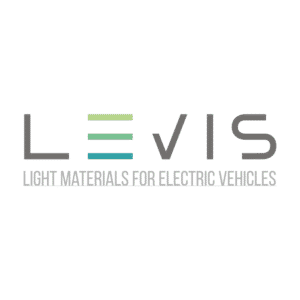LEVIS: Advanced Light materials for sustainable Electrical Vehicles by Integration of eco-design and circular economy Strategies
Context
The transition to sustainable personal mobility is a hot topic in transport decarbonisation. The automotive sector is the second largest contributor to CO2 emissions globally. Even though car manufacturers push forward the development of electric vehicles (EVs), the current market penetration is still relatively low. Developing lightweight materials is an essential step to increase EV adaptation since reduced weight results in improved vehicle efficiency and increased range.
Project brief
LEVIS is a three-year (2021-2024) R&D project on lightweight materials for electric vehicle applications and is funded by the EU H2020 funding program. Thirteen partners from the automotive and material industries and leading research institutes across Europe have teamed up to develop, demonstrate and validate lightweight components and/or structures used in EVs. LEVIS will deploy multi-material solutions based on fibre reinforced thermoplastic composites integrated with metal. The lightweight materials will be used in three demonstrators: a suspension control arm; a battery holding set (2 components) and a cross-car beam.
Objectives
By adopting eco-design and circular economy principles across the life-cycle stages of the EV components, the project aims at:
- Improving raw material, energy use and cost efficiency by using cost-effective and scalable manufacturing technologies
- Reducing EV components’ weight yet maintaining a high structural integrity and reliability
The three demonstrators will be used to showcase the benefits and competitiveness of the developed technologies and the environmental impact of the LEVIS solutions will be analysed throughout the components’ life cycle.
Cenex NL’s key contributions
Cenex NL is involved in both product design and evaluation phases. Our team will develop a methodology that integrates eco-design in the material and process selection at the early stages of the demonstrator development.
Cenex NL also leads the project evaluation and will assess the environmental and cost performance of the proposed solutions against their current benchmarks by conducting Life Cycle Assessments (LCAs) and Life Cycle Costing (LCC). These assessments will be used to ensure that the material choices, manufacturing technologies and proposed end-of-life processes will result in an overall improved environmental performance while being economically feasible.
This project has received funding from the European Union’s Horizon 2020 research and innovation progamme under grant agreement No 10100688.
![]()



